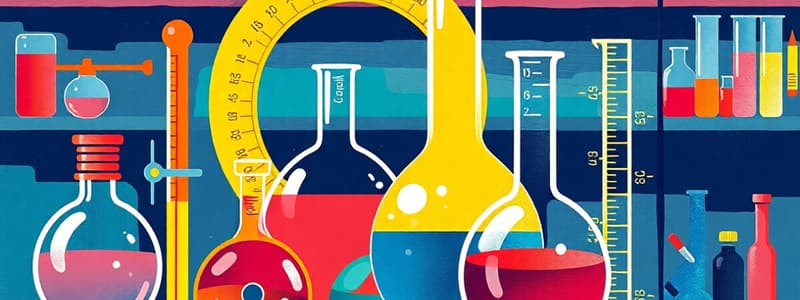Podcast
Questions and Answers
What is the primary property measured by a graduated cylinder?
What is the primary property measured by a graduated cylinder?
- Temperature
- Volume of liquids in precise units (correct)
- Length or Distance
- Mass
Which tool is best suited for measuring weight?
Which tool is best suited for measuring weight?
- Graduated cylinder
- Spring scale (correct)
- Beaker
- Thermometer
What should be considered when reading measurements from a graduated cylinder?
What should be considered when reading measurements from a graduated cylinder?
- The temperature of the liquid
- The color of the liquid
- The size of the cylinder
- The curvature of the liquid surface (meniscus) (correct)
Which of the following is NOT a common tool used for making observations in science?
Which of the following is NOT a common tool used for making observations in science?
Which piece of equipment is typically used to hold and mix liquids in experiments?
Which piece of equipment is typically used to hold and mix liquids in experiments?
In which type of science is a telescope primarily used?
In which type of science is a telescope primarily used?
What is the function of a compound microscope?
What is the function of a compound microscope?
What is the primary aim of science?
What is the primary aim of science?
Which scientific tool is best for measuring liquid volume accurately?
Which scientific tool is best for measuring liquid volume accurately?
Which of the following tools would be least useful in a chemistry lab?
Which of the following tools would be least useful in a chemistry lab?
What is the standard system of measurement used in scientific work?
What is the standard system of measurement used in scientific work?
Which scientific tool would NOT be appropriate for measuring temperature?
Which scientific tool would NOT be appropriate for measuring temperature?
Which tool is primarily used for observational purposes in biology?
Which tool is primarily used for observational purposes in biology?
Why might scientists use different tools in various branches of science?
Why might scientists use different tools in various branches of science?
In what way does technology impact scientific tools?
In what way does technology impact scientific tools?
Flashcards
What is the aim of science?
What is the aim of science?
The process of gaining knowledge about the natural world through observation, experimentation, and analysis.
What is empirical data?
What is empirical data?
Data that is verifiable and measurable, collected through experiments and observations.
What are scientific tools?
What are scientific tools?
Tools used by scientists to observe, measure, and experiment in order to collect empirical data.
What is the International System of Units (SI)?
What is the International System of Units (SI)?
Signup and view all the flashcards
What is a gram scale used for?
What is a gram scale used for?
Signup and view all the flashcards
What is a graduated cylinder used for?
What is a graduated cylinder used for?
Signup and view all the flashcards
What is a thermometer used for?
What is a thermometer used for?
Signup and view all the flashcards
What is a beaker used for?
What is a beaker used for?
Signup and view all the flashcards
Graduated Cylinder
Graduated Cylinder
Signup and view all the flashcards
Meniscus
Meniscus
Signup and view all the flashcards
Gram Scale or Balance
Gram Scale or Balance
Signup and view all the flashcards
Spring Scale
Spring Scale
Signup and view all the flashcards
Compound Microscope
Compound Microscope
Signup and view all the flashcards
Electron Microscope
Electron Microscope
Signup and view all the flashcards
Telescope
Telescope
Signup and view all the flashcards
Study Notes
Scientific Tools and Methods
- Science aims to understand the natural world by answering questions, explaining phenomena, and testing hypotheses.
- This requires gathering empirical data (verifiable and measurable observations).
- Scientists use a variety of tools for observation, measurement, and experimentation.
- Advances in technology improve scientific tools.
Common Lab Tools
- General Lab Tools: beakers, flasks, graduated cylinders, gram scales, thermometers, microscopes, petri dishes, and Bunsen burners.
- Different scientific disciplines use specialized tools tailored to their specific needs.
- Science is not limited to labs; it occurs in diverse environments (e.g., outdoors, underwater, space).
Measurement Tools
- Scientists use the International System of Units (SI) for measurement.
- The choice of measurement tools depends on the property being measured and the required precision.
- Measurement Tools & Properties:
- Graduated cylinder: volume (precise)
- Beaker: volume (less precise)
- Gram scale/balance: mass
- Spring scale: weight
- Thermometer: temperature
- Measuring tape/meter stick: length/distance.
Graduated Cylinders
- Graduated cylinders measure liquid volume precisely with markings.
- Cylinder capacities vary, as do markings on each; increments differ.
- Accurate volume readings require considering the meniscus (liquid's curved surface within the cylinder).
- The volume is read at the bottom (lowest point) of the meniscus.
Experimental Tools
- Experiments are vital to scientific inquiry.
- Choosing the right experimental tools depends on the experiment and field of study.
- Common experimental tools: Bunsen burners (heating), flasks (mixing/holding liquids), petri dishes (growing bacteria), and test tubes (mixing and observing).
Observational Tools
- Observation is crucial in science.
- Tools for observation vary based on the subject.
- Microscopes: Magnify small objects; compound microscopes use a simple lens system, electron microscopes offer higher magnification and 3D views.
- Telescopes: Used by astronomers to magnify celestial objects.
- Earth Science Instruments: Satellites are used with observational tools to study the Earth and atmosphere.
Studying That Suits You
Use AI to generate personalized quizzes and flashcards to suit your learning preferences.




